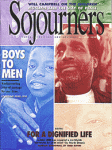When tragically violent events occur affecting Muslims, the world is not surprised to hear the United Nations or a Western state offering aid or intervention. Why do we rarely hear Muslims themselves or their governments protesting injustices, oppression, and brutality against kindred Muslims—other than those perpetrated by Israel against Palestinians and Lebanese? Why is the Islamic voice generally silent over the bloodshed in Tajikistan, Algeria, and Afghanistan, the treatment of Albanians in Kosovo, or the destruction of mosques in Chinese Turkistan?
These questions were addressed during a symposium on "Islam and Peace in the 21st Century" held in February at American University in Washington, D.C. Twenty-five Muslim scholars and activists from all parts of the Islamic world focused on issues of force, violence, social change, rethinking tradition, and the need for a global Islamic peace presence.
It is rare that Muslims from differing intellectual and ideological trends come together to address key problems of peaceful change in Islamic societies. The noted Sudanese scholar Dr. Abdullahi Ahmed an-Na’im challenged those present, "Stop lamenting! Stop exalting an ideal[ized] Islam! Look for the concrete logistics and mechanics for peace."
His call goes to the heart of why Muslims are not speaking with a unified voice on issues directly affecting the future well-being of Islamic societies. In the words of another participant, Dr. Sohail Hashmi, "Muslims have abrogated their responsibility to act for the common interests of the Islamic community or Ummah"—defined as a global community engaged in a moral mission derived from the Quranic revelation and prophetic example.
The problem of responsibility is not simple, nor easily brushed aside. Muslims are convinced that Islam as a faith and practice remains relevant for their problems today—its values and teachings are not outmoded. Yet their discourse on peace often takes the form of a lament for an idealized past greatness, hiding a bitterness over their current powerless conditions.
Culturally, socially, and economically most of the Islamic world is invaded by the secular consumerism of the global marketplace, with its escalation of desire for sensual pleasure and profitable corruption. Many Muslims realize that the cosmopolitan market of global commerce offers no collective responsibility, for consumption depends on the fabrication of needs as well as of goods. Even thoughtful Westerners see that social justice, ecological imperatives, and interests of the public good are incompatible with market ideology. They discern the hollowness of the global market imposing a "consumer orthodoxy" that impairs the capacity to create the community institutions on which civic responsibility and a democratic culture must rest; technology and communication are just as easily employed for repression as liberation.
THE ISLAMIC WORLD is in the midst of an extended period of political and social transformation aggravated by the shortcomings of the political class clinging to power through coercion and corruption. The ascendant politicized Islam of the "Islamists" tends to glorify violence and political revenge, while promising to install culturally authentic regimes. They offer naïve simplifications of Islamic history, ideology, and teachings in what Egyptian Professor Saad Eddin Ibrahim terms the current "dumbing down of Muslim fundamentalism."
Much contemporary Muslim discourse on the reinvention of tradition for social change exalts an idealized "Islam" victimized by enemy conspiracies. Pinning blame and exacting revenge seem to be the main concerns of the more radicalized individuals. Thus they evade the social and political demands of responsibility for civil liberties, social and economic justice, and creating a common purpose and conscious collective human order under the guidance of law. These goals are in harmony with essential Islamic values ideally embodied in the Ummah.
The lively debates currently under way among "thinking Muslims" over political accountability, pluralism, civil society, and democratic institutions help make a space for the humane, cooperative, non-coercive pursuit of common interests of Muslims everywhere. This requires a form of deliberative association not bound by identity politics, narrow parochial hatreds, or dogmatic traditionalism. Through repeatedly voicing these concerns in public forums across the Islamic world, the public voice of the "community" may be empowered more effectively than either the officially monolithic voice of states or the confusion of technological-commercial media.
Let us hear from Muslims what they think and feel about issues such as legitimate or sanctioned use of force, illegitimate violence, communal needs for peace building, and the creation of social justice. Let us learn what al-Islam, the "Religion of Peace," teaches on peace. Even more important is that Muslims themselves begin to hear this.
KARIM DOUGLAS CROW is coordinator of Islam and Peace for Nonviolence International, which cosponsored the February symposium on Islam and peace in the 21st century.

Got something to say about what you're reading? We value your feedback!